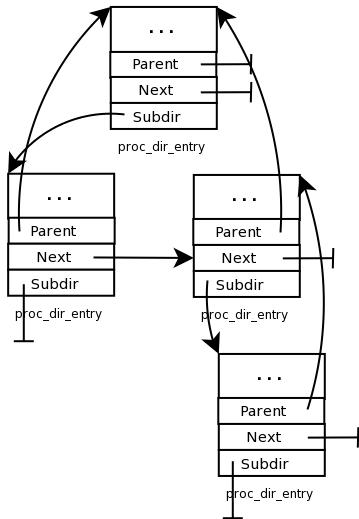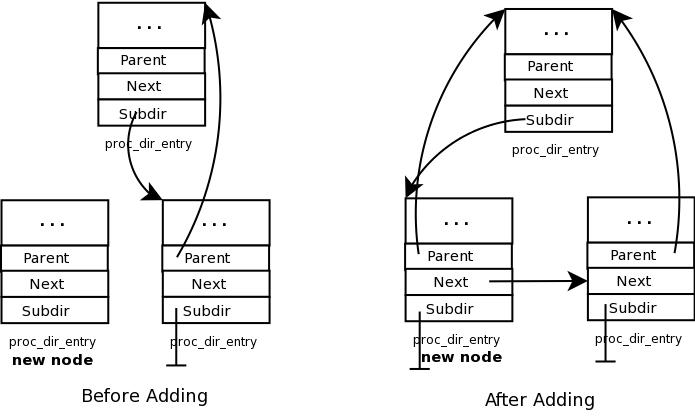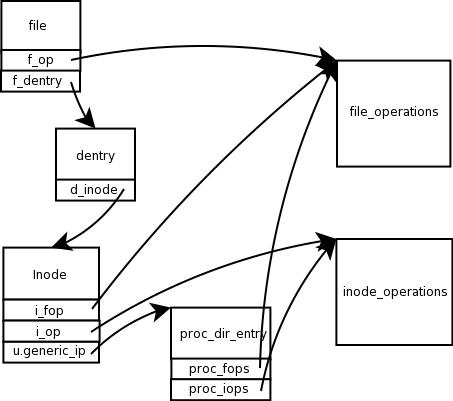[Articles Home]
Understanding the Proc File System
Introduction
Proc is an in-memory file system used to provide file based
communication with the kernel. It allows registration/unregistration
functions to create files and remove files on the fly. Any kernel
component that wants to communicate with the user can create a file
under the proc and that can be used to exchange data. Otherwise, it
will have to create a system call which the user has to know or has to
use some sort of IPC. Reading from and writing to a file is a common
operation and hence it makes lot of sense to have the communication
channel as a file. Proc create an infrastructure for doing that and
creates a simpler interface for kernel components to register files and
the corresponding handler (these handlers will provide the actual
functionality).
All the files under the proc file system reside in memory. There are
stored only in the RAM and hence they will be destroyed when the kernel
reboots.
Proc Infrastructure
Each proc entry(file and directory) is described using a
structure
proc_dir_entry.
struct proc_dir_entry {
unsigned short low_ino;
unsigned short namelen;
const char *name;
mode_t mode;
nlink_t nlink;
uid_t uid;
gid_t gid;
unsigned long size;
struct inode_operations * proc_iops;
struct file_operations * proc_fops;
get_info_t *get_info;
struct module *owner;
struct
proc_dir_entry *next, *parent, *subdir;
void *data;
read_proc_t *read_proc;
write_proc_t *write_proc;
atomic_t count;
/* use count */
int deleted; /*
delete flag */
kdev_t rdev;
};
The important fields are
name
|
Name of the file
|
uid
|
Owner ID of the file
|
gid
|
Owner group ID of the file
|
size
|
Size of the file
|
proc_iops
|
Inode operations table to be set
on the proc inode
|
proc_fops
|
File operations table to be set
on the proc inode
|
data
|
Used to store extra data. Proc
uses it to store the target path in case of a link.
|
get_info
|
Older handler to read from the
proc file
|
read_proc
|
Read handler of the proc file.
Called when something has to be read from the proc file.
|
write_proc
|
Write handler of the proc file.
Called when something has to be written into the proc file.
|
parent
|
Points to the parent entry. For
root most entry, this is null.
|
next
|
Points to the next entry. This
list is the list of all entries in a directory. Every entry points to
the same parent.
|
subdir
|
Points to the first child. For
leaf entries, this is null.
|
This parent, next and subdir fields are used to store the hierarchy of
the proc entries. Each proc entry stores the get_info, read_proc and
write_proc handlers. get_info and read_proc handlers are used for
handling read requests whereas the write_proc handler is is used to
handle write requests.

New entry creation
New entries are created under proc using the call create_proc_entry.
The prototype looks like this struct
proc_dir_entry
*create_proc_entry(const char
*name, mode_t mode, struct proc_dir_entry
*parent);
This call takes a name, mode and the parent entry and creates an entry
under the parent with the name as 'name' and fills the important fields
like proc_iops, prof_fops etc on the entry. This will also insert the
entry in the proper location in
the proc hierarchy. The newly created proc entry will be returned. The
caller will have to fill the remaining fields
like size, get_info, read_proc, write_proc, uid, gid etc.
The name can also be a relative path under the proc. For example, if
the name is 'proctest' a file will be created which will look like
'/proc/proctest'. If the name is 'fs/proctest', the file will be
created as '/proc/fs/proctest'.
This entry will be inserted at the beginning of the subdir list of the
parent entry. The root most entry of the proc file system is defined as
a global variable proc_root. This can be used to pass as the parent for
this function. For example, if we want to create a file /proc/proctest,
we can call like this
proc_dir_entry *new_entry = create_proc_entry("proctest", S_IFREG,
&proc_root);

If the entry is a directory, it
sets the proc_fops with the table with lookup handler (lookup handler
is
needed only for directories). If it is a link, it sets to a different
inode operations table which has readlink and follow_link handlers.
For regular files, it sets the proc_fops with the table with llseek,
read and write handlers (these are the proc handlers). For directories,
it sets it to a table with only one operation readdir. The will be
called when the directory contents have to be read.
These are set by default but the caller can always overwrite them after
creating the entry. In that case, the handlers of the new tables will
be called and the caller is responsible to handle them. This strategy
is adopted by files which copy lot of content. Proc files handling
through the read_proc callback has to copy into a proc buffer which
will be copied into the user space. Instead of this, we can register a
new file operations table so that our handlers get called. We can
directly read/write into the user buffer. The handler for '/proc/ksyms'
uses this strategy.
Entry deletion
The function to be used to delete an entry is void
remove_proc_entry(const char *name, struct proc_dir_entry *parent);
VFS interaction
Proc registers proc file system with the kernel. The mount point is
chosen as "/proc". The file system name is "proc". Proc has to support
directory browsing, file access. So, it supports lookup handler of the
inode operations table, readdir, read, write and llseek of the file
operations table.
The read_super handler of the file system type structure is called when
the file system is mounted. This will fill the super block structure
with the proper fields. The important field is the s_root which should
be filled with a dentry object containing the inode object for the root
most directory of the file system.
Lookup operations
The lookup handler of the inode operations is the place where new inode
objects (wrapped in dentries) are generated. The root most entry is
returned at the time of mounting. For every inode, proc has to set two
important fields i_op and i_fop i.e., the inode operations and the file
operations tables. The lookup handler is part of the inode operations.
proc_lookup is the lookup handler for proc.
For every inode returned, a pointer to the corresponding proc_dir_entry
is stored in the u.generic_ip (it is of type void *). With this, we can
easily get the proc entry structure from the inode.
struct dentry *proc_lookup(struct
inode * dir, struct dentry *dentry)
When the kernel looks up for some file, it calls the lookup
handler of the inode operations table of the parent's inode. When
proc_lookup is called, the inode of the parent entry is passed and also
the dentry of the new entry which has to be filled with the new inode.
Since the proc entry pointer is stored in the inode object, we can get
the proc entry of the parent inode. The hierarchy is already present.
So, the children of the parent entry are scanned to see if there is any
entry with the matching name (the required name is stored in the dentry
argument). If it finds an entry, it allocates an inode, sets the proc
entry in the u.generic_ip of the inode and fills the required inode
fields from the proc entry structure. It sets the i_op and i_fop fields
of the inode with the proc_iops and proc_fops fields of the entry
respectively.
This callback is very important because this is the place to set the
pointers to the operation tables. The following diagram shows the
relation between various data structures after a file object is
constructed for the proc entry.

readdir operation
When the user wants to see the contents of a directory, the readdir
handler of the file operations table of the directory is called.
proc_readdir is registered as the handler. This is its prototype:
int proc_readdir(struct file * filp,void *
dirent, filldir_t filldir);
From the filp->f_dentry->d_inode, we can get the inode object.
The proc entry is stored in the inode->u.generic_ip. So, we can get
the proc entry structure from the file object. The subdir field of the
proc entry points to its children.
int proc_readdir(struct file * filp,
void * dirent, filldir_t filldir)
{
struct proc_dir_entry * de;
unsigned int ino;
int i;
struct inode *inode
= filp->f_dentry->d_inode;
ino = inode->i_ino;
de = (struct
proc_dir_entry *)
inode->u.generic_ip;
if (!de)
return -EINVAL;
i = filp->f_pos;
switch (i) {
case 0:
if
(filldir(dirent, ".", 1, i, ino, DT_DIR) < 0)
return 0;
i++;
filp->f_pos++;
/* fall
through */
case 1:
if
(filldir(dirent, "..", 2, i,
filp->f_dentry->d_parent->d_inode->i_ino,
DT_DIR) < 0)
return 0;
i++;
filp->f_pos++;
/* fall
through */
default:
de =
de->subdir;
i -= 2;
for (;;) {
if (!de)
return 1;
if (!i)
break;
de = de->next;
i--;
}
do {
if (filldir(dirent, de->name, de->namelen,
filp->f_pos,
de->low_ino, de->mode >> 12) < 0)
return 0;
filp->f_pos++;
de = de->next;
} while (de);
}
return 1;
}
Write operation
The handler for write operation registered by proc is proc_file_write.
The prototype is this funciton is:
ssize_t proc_file_write(struct file * file,
const char * buffer, size_t
count, loff_t *ppos)
The proc entry can be easily obtained from the file pointer. If the
proc entry has a write_proc handler registered, it will be called.
Otherwise it returns a -EIO.
Read operation
The handler for read operation registered by proc is proc_file_read.
The prototype of this function is:
ssize_t proc_file_read(struct file * file, char * buf, size_t nbytes,
loff_t *ppos);
The handler implementation is slightly complex. If the proc entry has
get_info handler, it calls get_info. Otherwise it checks for read_proc,
and if it is available, it will be called. So, before calling the
handler, a page of memory will be allocated and this will be used to
copy data from the handler to the user space. The read_proc/get_info
handlers write into the page and this will be copied into the user
space.
/* buffer size is one page but our output routines use some slack for
overruns */
#define PROC_BLOCK_SIZE (PAGE_SIZE - 1024)
static ssize_t
proc_file_read(struct file * file, char * buf, size_t nbytes, loff_t
*ppos)
{
struct inode * inode = file->f_dentry->d_inode;
char *page;
ssize_t retval=0;
int eof=0;
ssize_t n, count;
char *start;
struct proc_dir_entry * dp;
dp = (struct proc_dir_entry *)
inode->u.generic_ip;
if (!(
page =
(char*) __get_free_page(GFP_KERNEL)))
return -ENOMEM;
while ((nbytes > 0) && !eof)
{
count = MIN(PROC_BLOCK_SIZE,
nbytes);
start = NULL;
if (
dp->get_info) {
/*
* Handle
backwards compatibility with the old net
*
routines.
*/
n = dp->get_info(page, &start,
*ppos, count);
if (n <
count)
eof = 1;
} else if (
dp->read_proc) {
n = dp->read_proc(page, &start,
*ppos,
count,
&eof, dp->data);
} else
break;
if (!start) {
/*
* For
proc files that are less than 4k
*/
start = page +
*ppos;
n -= *ppos;
if (n <= 0)
break;
if (n >
count)
n = count;
}
if (n == 0)
break; /* End of file */
if (n < 0) {
if (retval ==
0)
retval = n;
break;
}
/* This is a hack to allow
mangling of file pos independent
* of actual bytes
read. Simply place the data at page,
* return the bytes,
and set `start' to the desired offset
* as an unsigned int.
-
[email protected]
*/
n -= copy_to_user(buf, start < page ?
page : start, n);
if (n == 0) {
if (retval ==
0)
retval = -EFAULT;
break;
}
*ppos += start < page ?
(long)start : n; /* Move down the file */
nbytes -= n;
buf += n;
retval += n;
}
free_page((unsigned long) page);
return retval;
}


